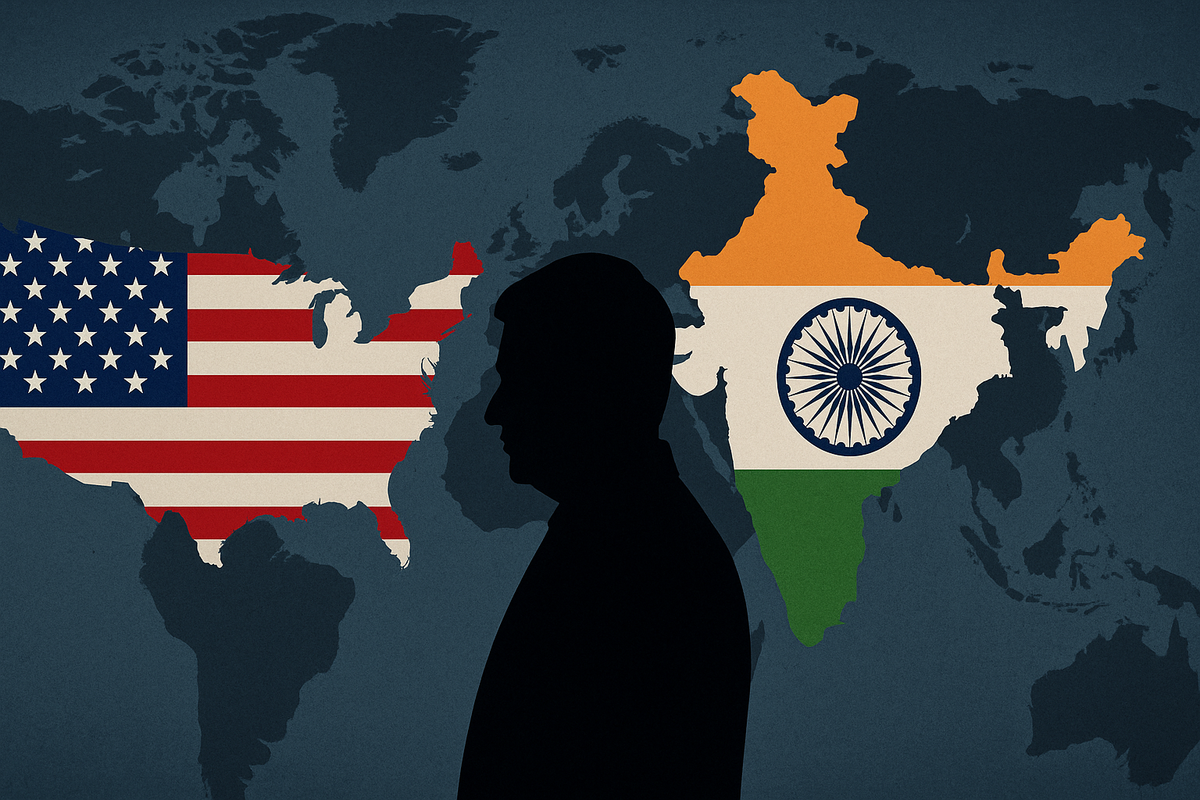From Friend to Frenemy: Why America Can’t Fully Trust India and Vice Versa
Despite glowing declarations of partnership, the U.S. and India remain uneasy allies. Old wounds, divergent interests, and strategic suspicions persist beneath the surface. This relationship is driven by shared fears of China, not genuine trust or ideological unity.

The United States and India enjoy referring to each other as "natural allies."
Washington and New Delhi politicians produce rosy rhetoric, vowing a relationship to frame the 21st century.
Behind the photo opportunities and trade agreements, however, is an unuttered, chilling reality: America does not entirely trust India. And India does not entirely trust America.
If you assume this is mere geopolitics paranoia, think again.
The US-India relationship is a marriage of convenience—and the cracks are beginning to appear.
Here's why.
US & IN The Official Love Story
Since the early 2000s, the US and India have declared a "strategic partnership."
Defense agreements have multiplied:
- BECA (Basic Exchange and Cooperation Agreement)—sharing geospatial intelligence.
- COMCASA—secure military communications.
- LEMOA—logistical support between armed forces.
Trade has boomed:
- Bilateral goods and services trade now exceeds $190 billion a year.
People-to-people ties are strong:
- More than 4 million Indian Americans.
- Hundreds of thousands of Indian students at US universities.
Shared concerns:
- China's aggressiveness.
- Islamist extremism.
- Economic development.
So why does this supposedly perfect couple feel uncomfortable?
The Trust Gap: India's Perspective
India's mistrust of America is deep and it's not history.
- The Cold War Wounds
- The US treated India as a nuisance for decades.
- Washington courted Pakistan, India's nemesis.
- The 1971 Bangladesh Liberation War? America threatened India with the Seventh Fleet.
- To New Delhi’s old guard, these memories are scars.
- The Sanctions Trauma
- In 1998, India tested nuclear weapons.
- America slapped crushing sanctions, isolating India diplomatically.
- Even today, Indian policymakers remember how quickly Washington turned punitive.
- Reliability Anxiety
- Many Indian strategists believe the US is a fair-weather friend.
- What if America cuts weapons sales over human rights?
- What if a future president courts Beijing again?
India’s mindset:
Never trust a superpower completely.
The Trust Gap: America’s View
America's distrust of India is just as genuine.
- Russia Connections That Just Won't Quit
- Even with Russia's invasion of Ukraine, India continues to purchase Russian oil and arms.
- The US has pleaded with India to cut back on connections—but New Delhi maintains it requires Moscow's arms.
- To Washington, this is hypocrisy.
- Economic Nationalism
- India faces pressure to open its markets completely.
- American businesses encounter regulatory headaches and protectionism.
- The US views India as an ally in theory but a difficult shopper in reality.
- China Hedging
- Though India battles China along the Himalayas, it does not go all in with America.
- New Delhi eschews joining official military alliances.
- For US hawks, this means that India will never be anything more than a semi-ally.
America's frame of mind:
India desires our weapons and tech but refuses to take sides.
The Quad Mirage
The "Quad"—the US, India, Japan, and Australia—was celebrated as an "Asian NATO."
In fact:
- India prevents attempts to militarize the Quad as an alliance.
- New Delhi maintains the association is strictly about "security cooperation."
- India fears that openly confronting China will invite war that it cannot manage on its own.
This angers U.S. strategists, who desire India as the leader of Indo-Pacific containment.
That is, as follows:
The Quad is more play-acting than bite.
Tech Wars and Digital Sovereignty
Technology is another fault line.
- America needs India to build a wall around Huawei and embrace Western tech standards.
- India, fearful of snooping and digital colonialism, is constructing its own data rules:
- The Data Protection Bill is imposing strict localization norms.
- US companies like Amazon and Google are spooked by India's "tech nationalism."
Meanwhile, India is set to construct "Digital India"—on Indian terms.
Translation:
Cooperation? Yes. Dependence? Never.
Pakistan: The Ever-Present Shadow
Regardless of how close US-India relations become, Pakistan is the elephant in the room.
- Washington continues to view Islamabad as a counterterror ally it can't do without.
- Weapons to Pakistan infuriate India.
- The Taliban takeover in Afghanistan demonstrated that US-India interests don't always coincide in South Asia.
To India, the takeaway is evident:
America will always hedge its bets in the region.
India's Strategic Autonomy Doctrine
India's elite consensus rests on one doctrine: strategic autonomy.
- India will not be anybody's junior partner.
- India will not sign binding pacts.
- India will purchase weapons and oil from whomever it chooses.
In Washington's eyes, this makes India an untrustworthy pillar in any anti-China plan.
The Economic Friction
Even economically, this "friendship" is transactional.
- The US expects India to liberalize markets for American foodstuffs and tech firms.
- India believes liberalization will ruin its farmers and small industry.
- Tariffs, data localization, and e-commerce controls continue to flare up.
The consequence:
A trade relationship full of promise and endless spats.
The Spy Game Nobody Speaks About
In the background, mistrust of intelligence brews.
- The US shares intelligence on a need-to-know basis.
- India shares much less.
- India's intelligence organizations are highly suspicious of Western intentions.
The CIA-RAW relationship is formal but wary.
In an age of cyber espionage and cyberwar, this inhibits true trust.
Multiple Worldviews
America perceives the world ideologically:
- Democracy vs. authoritarianism.
- Rules-based order vs. chaos.
India perceives the world pragmatically:
- National interest above all.
- Multipolarity over blocs.
This philosophical distinction is the reason why US-India cooperation too often rings hollow.
Why This Matters
Why should you care that America and India can't really trust each other?
Because this relationship will determine:
- China's rise or containment
- The future of the Indo-Pacific
- Global technology standards
- Climate cooperation
If America wants India to be a dutiful ally, it will be disappointed.
If India wants America to never push it on democracy or Russia, it too will be disappointed.
The Future: Cold Realism
Here's the hard truth:
- America and India will continue to move closer—on trade, defense, and tech.
- But neither will ever fully trust the other.
- It's not a love story it's a strategic dalliance.
Expect more summits. More statements. And more friction.
Because the US and India are bound together by shared interests—but separated by mistrust.
Final Takeaway
From friend to frenemy—that’s the US-India story.
A partnership driven less by affection than by shared fears of China.
A bond strong enough to cooperate but too brittle to count on completely.
If you want to understand the next decade of geopolitics, watch this relationship.
It will never be as warm or as consistent as the speeches promise.
Sources
- CourtListener
- Justia
- Archive.org
- Google Trends
- US Department of State Press Releases
- Ministry of External Affairs, Government of India
- The Economist, Reuters, The New York Times, The Diplomat
For more legal exposes and truth-behind-glamour stories, subscribe to AllegedlyNewsNetwork.com




